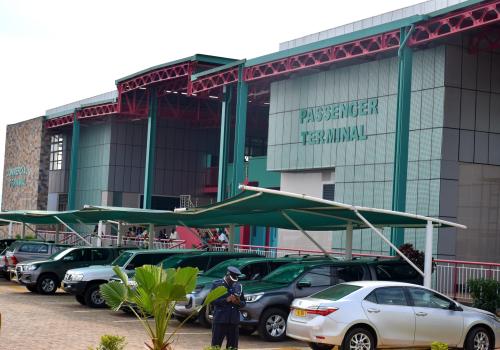On 7th of February 2024, fisheries and regulatory officials from the Southern African Development Community (SADC) Member States, accompanied by representatives of private entities in the fish value chain from Malawi and Zambia, visited the Mchinji/Mwami One Stop Border Post (OSBP) in Malawi. The purpose of the visit was to gain a comprehensive understanding of the OSBP's operations in clearing fish and fishery products, as well as to identify obstacles that may hinder the efficient clearance process.
The Mchinji OSBP, located 120km from the capital city of Malawi, Lilongwe which is in the Central Region of Malawi, has recently standardised its operations and established synergies with Mwami OSBP on the Zambian side. Both these borders resumed OSBP functions in November 2023 after being officially opened by the Presidents of Malawi and Zambia. The automation of systems and the synergies at these borders have significantly reduced the real-time clearance of the movement of people and goods, particularly perishable foods such as fish and fishery products.
Mrs. Tapiwa Mzunga, the Station Manager at Mchinji OSBP, emphasised the importance of harmonised and standardised processes between the two borders. She said fish is a critical commodity of trade in Malawi and Zambia and is accorded preferential treatment during clearance to ensure its delivery in good condition.
Mrs. Mzunga stated that the selection of the Mchinji/Mwami borders as an OSBP pilot project has greatly eased the challenges previously associated with delays in the movement of people and goods. She expressed her satisfaction that border users and cargo no longer need to stop in both countries but only at the country of destination, where assistance is provided in a timely manner.
Mr. Malama Chiwama, the Assistant Commissioner of the Revenue Authority of Zambia at Mwami OSBP, explained that the ultimate intention of the authorities is to further transform Mchinji/Mwami OSBPs into Non-Stop Border Posts (NSBP). He said that this would eliminate the need for people and cargo trucks to stop for clearance and instead utilise a human-free automation system.
He asserted that the enhanced border operations have considerably resulted in time and cost savings for fish traders, as perishable commodities like fish can now be cleared within a short period. Furthermore, he mentioned that fish and fishery products sourced from the SADC region are exempt from customs and tax duties, further reducing the costs associated with border movement.
Mr. Chiwama also stated that traders have the option to submit the clearance documents five days prior to the arrival of goods at the borders, thereby reducing the processing time for fish and fishery products.
He commended the two Governments for their efforts in reducing bureaucratic procedures at the border by implementing measures to streamline the number of agencies from 22 to 6. He stressed that this has significantly minimised human intervention at the borders and will enhance operational efficiency, resulting in reduced congestion.
Mr. Francois Denner, the Technical Expert for United Nations Industrial Development Organisation (UNIDO), expressed gratitude to the two governments for their efforts in ensuring the smooth operations of the facilities. He underscored that the next phase of work at the borders is to observe the current clearance procedures for fishery products, including conformity assessments, review of ISO standards and fish standards, and undertake inspection and monitoring of Sanitary and Phytosanitary (SPS) measures.
Dr. Alexander Kefi, the SADC Project Coordinator for the Programme for Improving Fisheries Governance and Blue Economy Trade Corridors (PROFISHBLUE Project), a project funded by both the African Development Bank (AfDB) and SADC highlighted the collaborative efforts of Member States to harmonise standards and align synergies under the PROFISHBLUE Project.
He emphasised the importance of achieving the expected deliverables and noted that thus so far, a total of 13 standards have been harmonised at the regional level. Dr. Kefi encouraged Member States to continue improving synergies to enhance and achieve meaningful trade opportunities. He also commended Member States for their commitment to accelerating fish trade through the scaling up of systems, processes and multilateral partnerships.
In an effort to improve coordinated border management, the officials also discussed other pertinent matters such as the use of information technology and computerised customs management systems, as well as data systems collection, including single window initiatives and integrated border management systems.

